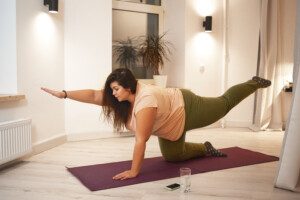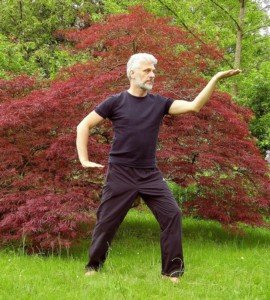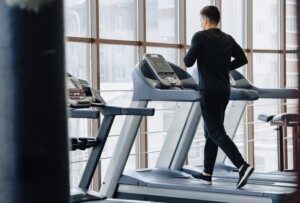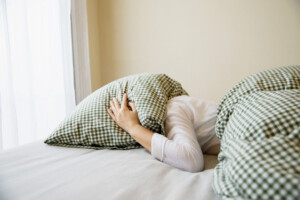Do you toss and turn in your sleep, have trouble falling asleep or, once you wake in the middle of the night, can’t get back to sleep and are left feeling awful when it’s time to get out of bed for the day?
Even if sleeping pills including prescription have failed to remedy this problem, there are four types of exercise that you need to try.
These four venues of physical activity have been scientifically proven to make a big difference in treating insomnia.
This comes from pooled data analysis published in BMJ Evidence-Based Medicine (2025).
- Walking
- Jogging
- Yoga
- Tai Chi
Keep reading…
These four kinds of exercise may be among the most effective for improving sleep and easing insomnia, according to the analysis.
Insomnia isn’t just the inability to “fall asleep” once someone goes to bed.
There are those who easily slip into slumber, but then frequently awaken throughout the night, or, they awaken too early and then can’t get back to sleep.
Insomnia is linked to increased risks for both mental and physical health issues, such as cardiovascular disease and cognitive decline.
Even if medications have worked well for you, remember, they can come with side effects.
A proven treatment for difficulties with sleep is cognitive behavioral therapy, but access to this is limited due to not enough trained providers.
But exercise? Anyone can do the aforementioned four (even if you’re not flexible – yoga positions can be modified), and they won’t leave negative side effects.
Although previous research has suggested that physical activity can benefit sleep, most existing guidelines remain vague about which types of exercise work best.
The team of researchers undertook a comprehensive meta-analysis designed to compare the effectiveness of various exercise modalities in treating insomnia.
How was the analyses done?
They reviewed scientific databases for randomized controlled trials published up to April 2025, ultimately including 22 studies in their analysis.
The selected trials involved a total of 1,348 participants and evaluated 13 different interventions for insomnia — seven of which were exercise-based.
These included:
- Yoga
- Tai Chi
- Walking or jogging
- Strength training
- Aerobics and mixed aerobic workouts
- Combinations of aerobic activity with therapy.
Program durations varied, lasting from four to 26 weeks.
Other treatments assessed in the analysis included cognitive behavioral therapy, sleep hygiene education, acupuncture and massage.
Additionally, the team looked at subjective and objective metrics, including total sleep time, frequency of nighttime awakenings and how long it takes to fall asleep.
What were the results?
CBT remains a highly effective approach, improving total sleep time, sleep quality and reducing the time it takes to fall asleep.
However, walking and jogging appeared to reduce insomnia severity significantly.
Tai Chi increased total sleep by nearly an hour, reducing nighttime awakenings by over 30 minutes, and decreasing the time it takes to fall asleep by approximately 25 minutes.
Further analysis revealed that Tai Chi outperformed existing treatments across all major sleep-related outcomes, with effects lasting up to two years in some cases.
Yoga was associated with an increase in total sleep time by nearly two hours, improved sleep efficiency by close to 15% and a decrease in the amount of time spent awake during the night by almost 60 minutes.
Why These Four Exercises Improve Sleep

Freepik/shurkin_son
Yoga’s integration of breath control, body awareness and meditative focus may help to recalibrate brain activity, reduce anxiety and depression, creating an emotional calm.
Tai Chi, with its emphasis on slow, mindful movement and breath regulation, is thought to lower activity in the sympathetic nervous system, which governs the body’s stress response.
By promoting emotional balance and mindfulness, it may reduce mental overactivity and anxiety, contributing to better sleep quality.

There’s also evidence that Tai Chi may reduce systemic inflammation, offering additional health benefits.
Walking and jogging may also play a crucial role by boosting energy expenditure, lowering cortisol (the stress hormone) and enhancing natural melatonin production.

Freepik/pressahotkey
Limitations of the Investigation
The researchers caution that a majority of the included studies — 68%, to be precise — had design or methodological limitations.
Inconsistent reporting on the frequency and intensity of the exercise routines, as well as small sample sizes, may limit the precision of the conclusions.
Nevertheless, the team points out that the analyses show that exercise deserves a more prominent role in standard treatment protocols for sleep difficulties.
Can Insomnia Increase PVCs (Premature Ventricular Contractions)?
 Lorra Garrick is a former personal trainer certified by the American Council on Exercise. At Bally Total Fitness, where she was also a group fitness instructor, she trained clients of all ages and abilities for fat loss and maintaining it, muscle and strength building, fitness, and improved cardiovascular and overall health.
Lorra Garrick is a former personal trainer certified by the American Council on Exercise. At Bally Total Fitness, where she was also a group fitness instructor, she trained clients of all ages and abilities for fat loss and maintaining it, muscle and strength building, fitness, and improved cardiovascular and overall health.
.










































